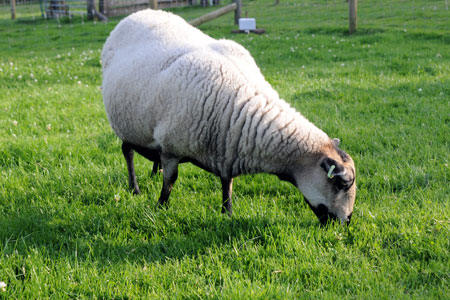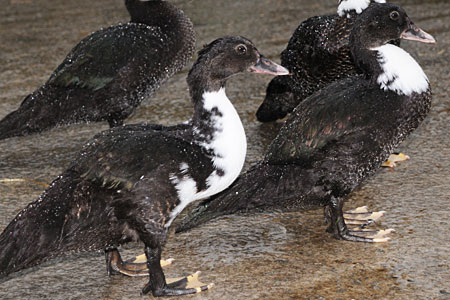Welcome to Relaxed Farming
- Alpacas
- Chickens
- Dairy Goats
- Ducks
- Geese
- Pigs
- Pygmy Goats
- Quail
- Rabbits
- Sheep
- Turkeys
- Polytunnel
- Photo Stories
- Video Stories
- Food
- Smallholding Map
- 2013
- 2014


- August
- September
- October
- November
- December
- January
- February
- March
- April
- May
- June
- July
- August


- 1
- 2
- 3
- 4
- 5
- 6
- 7
- 8
- 9
- 10
- 11
- 12
- 13
- 14
- 15
- 16
- 17
- 18
- 19
- 20
- 21
- 22
- 23
- 24
- 25
- 26
- 27
- 28
- 29
- 30
- 31
Saturday, 19th July 2014
We have had some of that much needed rain this week with the result that our grass is looking so much better (first photo) and our ducks have been enjoying the water on their backs (second photo). The better grass is a bit of a relief as we were starting to get quite worried about the sheep and in particular the lambs who are after all meant to be putting on weight!! As well as the rain the grass has had fertiliser spread on it. We don't use a lot of artificial fertiliser at all (instead we tend to rely on the animal poo and wee putting minerals back into the soil) but after the very wet winter we have had we are aware that a lot of the minerals and goodness in our soil has probably been washed away. The fertiliser we use is called NPK - these three letters stand for three chemicals: Nitrogen (N), Phosphorus (P), and Potassium (K). (Potassium is K is because the Latin word for Potassium is kalium!!). These three are essential for plant growth and NPK is used by gardeners and farmers alike to give their plants, including grass, the best possible conditions to grow in.
As well as starting to grow again and looking greener, the other difference we have noticed in the grass is the reappearance of lots of clover. When we reseeded our paddock in the first couple of years here we included a seed mix that contained clover. Clover is a favourite for the sheep, is quite rich and those pesky worm larva that like to live in a sheep's gut find it difficult to climb (thin stems and broad leaves). It is a bad idea to have a lot of clover in a paddock though, as the sheep may gorge themselves and get bloat but if eaten with lots of other grasses it is fine. We have white clover which is meant to be better than the red clover. Can you see all the flowers behind Mrs White?
And whilst the sheep and goats enjoyed the effect the rain had, the ducks enjoyed the rain itself. The droplets you can see on their backs show how good their feathering now is. At just seven to eight weeks old, these ducks have now pretty much got all their adult feathers which are totally waterproof. A lot of time each day is spent preening to keep them in tip-top condition.
Finally an update: the quail we mentioned back on 2nd July did not manage to hatch out any chicks in the end, not sure why. We now need a 'Plan B' if we want to raise quail again this year: will keep you posted!

